Interview: Katy Lipson Talks ASPECTS OF LOVE at Southwark Playhouse
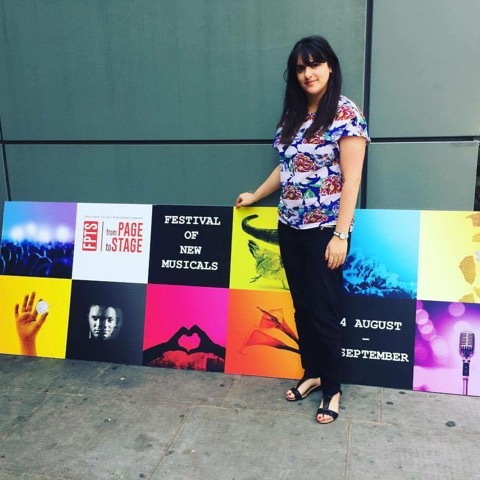
Theatre producer Katy Lipson - who is producing artistic director of the Hope Mill Theatre in Manchester, as well as being an independent producer and who has recently taken on the road shows such as The Addams Family - is bringing Andrew Lloyd Webber's 1989 musical Aspects of Love to Southwark Playhouse which began at Hope Mill in August 2018.
Here, we discuss what makes a good producer, her passion for theatre, and how the show resonates with the present times.
When did you realise you wanted to become a producer?
I think I had that lightbulb moment in about 2011. Having said that, I was producing before that - little cabarets where I was musical director and producing and showcasing new musicals - but it wasn't until 2011 when I thought "Wow, OK, this is really something I want to pursue on a larger level".
I was sat in a lecture at the Stage One producers new workshop, which is a three-day seminar to learn about commercial producing. At the same time, I was musically directing a new musical, and I realised that I wanted to take that show under my wing and develop it.
I think with those two things together, suddenly I had this realisation that I'd found the perfect job for me and I couldn't have been more certain. That was the path I wanted to pursue. So, I can actually identify that in a moment, which I don't know if a lot of people can do. That was what I wanted to pursue and focus on for the rest of my career.
I was doing other things before - I was a singer, a musical director, I'd been a teacher, I produced for this other company that I set up with my friend from university 10 or 11 new musical showcases.
At that point, I was very creative and I was still at the piano playing, selecting all the artists, doing everything in small little shows, but I was responsible for all the administration as well as being a creative. I liked that, but I didn't really know how that became a business, how that grew, and it wasn't until I started to look at the wider ecology of theatre that I realised that I could be part of that and I wanted to.
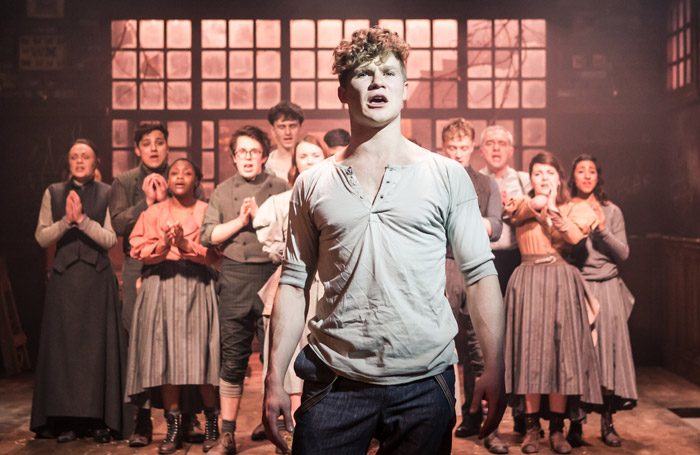
What do you think it takes to be a good producer?
First of all, you have to have passion and you have to have good ideas. Ultimately, a producer is the person who either selects or is pitched to or comes up with an idea to do a certain piece or to develop something. You have to be really creative and driven to make content. If you don't have ideas or a gut instinct, you can't really pursue it.
You'll be drawn to that because of the level of management and creative decisions. You have to be organised. Running any business, there's a certain amount of organisation. You have to be firing off emails, budgeting, meeting investors, juggling so much at the same time. So, organisation and a sense of time management is hugely important.
You have to be very good with people. You're managing all kinds, from money people to creative people, to people who have all different personalities, and you have to realise what your angle is to get the best resource. You have to manage those people to the best of your abilities.
I think you've got to be able to know when to grow as well. I always say that business is business, but this is creative business. What's hard about that is that you're very emotionally invested. You have to be able to use that to your advantage, but also acknowledge when you can't let your heart win over your head.
At the end of the day it's business - you have to be able to make ends meet and that's why you're doing it. You need knowledge, I think you need to understand theatre, genre, what's good, what's bad, what you like, what you don't like, why it didn't work. It's going to make you better, it's going to make you make better decisions, it's going to help you grow.
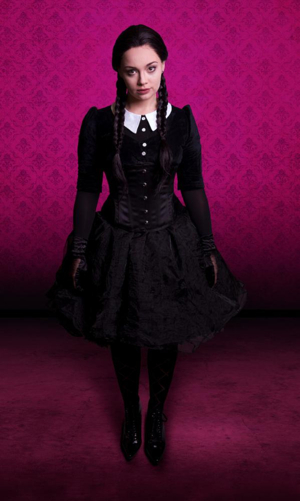
The Addams Family
How did you fall in love with theatre?
I was brought up in a very musical household. My company is most known for musicals and as a child my house was full of music. My mum played the piano, she played all the mixtapes of Rodgers and Hammerstein, Andrew Lloyd Webber, Stephen Sondheim all the time. I watched all the movies with my grandparents - they loved show movies, MGM musicals.
I started singing when I was very young - I was singing in the school play, acting, sometimes the leading part in these shows. And I was a reasonably talented musician. I loved playing the piano, I liked doing the classical grades, but I also liked to improvise. I had that creative flair.
Then I learnt how to play the cello and I was in an orchestra, I was really passionate about getting better and being able to play all the Andrew Lloyd Webber songbook as if I was an orchestra. I wouldn't have been drawn to theatre if I hadn't had an instinct inside of me, but whatever I had inside of me was able to flourish through my family's love of it. I was able to really enjoy the genre that I'd been introduced to and I took it upon myself to extend my understanding of it.
You're known for juggling many projects at once - how do you do it?
A lot of these projects are at different stages of development. I take time off, don't get me wrong, but it's my passion and I keep developing new projects or thinking about things. I have a knowledge in terms of what's out there, what's on Broadway, what's on Off-Broadway, who are the writers of today, what's new, what's not new.
I focused on one genre, which is musical theatre primarily, which meant that I could have a great understanding of what catalogue musicals in terms of revivals were out there, what hadn't been revived for a while, what was worth reviving, what revival was going to get me to the next step of my career - whether it's to get more recognition, good reviews, more investors.
I guess what I'm trying to say is that it's not a problem for me to find content because I'm constantly searching for it. I invested so much in learning - not encyclopaedic knowledge, but a good overview of musical theatre history. Because I've always had that, I don't have to wonder what's the next show, I already have my bucket list. That already gets me ahead, because there's always something bubbling on in the background.
Once you know what's your next revival, I don't have to sit and read five shows, because I've probably already done it. That's the first thing: having a constant awareness of what's out there and being invested in that. I've taken the time to know my genre and my history of titles.
Then, there's the experience. The more you do, the more you're able to create a fringe musical. I have relationships with venues like Southwark Playhouse and now obviously my home, the Hope Mill Theatre. I have an awareness of how to make a show work. I have a list of directors I trust, so I can build a team easily and I don't have to sit pondering about who I'm going to use, who's going to do marketing or PR. It's about taking baby steps and learning and learning from your mistakes, which you'll always do.
And then, going back to your second question, being a producer is being the ultimate project manager and I feel like I found what I'm good at. I'm able to process information very quickly, to stay on top of deadlines, I'm able to delegate to the right people, to have a team of people who deliver well together and who come to me when they need support, to build a budget. I know where I'm at in terms of my commercial growth, how much money I can raise, and all of those things.
Now in 2019, hopefully, I'm going to be transitioning to a point where I can actually do maybe a couple more large-scale projects. Having said that, I need to find out what they might be. Every show I do, I believe it should happen rather than doing it only to bring in producing royalties.

What's the biggest challenge you've encountered?
The fringe is always difficult. I've got my experience there - you're trying to create magic with much smaller budgets. Often you do lose money so you try to find, and no one's got an infinite supply, so you need to find investors who are on that journey with you.
Finding money is always hard - that's a full-time job in itself. And you have to do it again, and again, and again. Managing your financial aspirations in line with your creative aspirations is hard. Then the other hard thing is managing the creative side of the fringe.
There's always a triangle: cheap, fast, and good. If something's cheap you're never going to get it fast. You're going to have someone ringing up hundreds of suppliers to see if they can donate something for the production. It's difficult. I'm not saying that you should be flippant with money when you're on the commercial scale, but you get a set design, you get it built, it arrives. On the fringe, you don't. You have to make it happen for no money, people are there until midnight painting it, including yourself.
Then you realise you understand the value of money, the value of time, of people giving their time and going over and beyond what they're getting paid for. All in the spirit of being equal with the producer. For me, I'm very passionate about new writing and I feel like this infrastructure is hard for new musicals. I've got a lot of battles to face because I want to lead producing new musicals.
A lot of the revivals, I don't want to take them to the West End, I don't feel there's a place for them. Ultimately, I'm looking at the fringe and touring market and then waiting to create my own new musicals, which might have a trajectory that moves into the West End.
Why did you want to produce Aspects of Love?
It's one of the ones that was on my bucket list. Andrew Lloyd Webber, you can't not acknowledge what he's done for musical theatre and particularly British musical theatre. I love sung-through musicals. That was one of the shows that my grandfather used to sing to me - I used to sing and play at the piano with him.
It's such a romantic, lush score. When I delved into it deeper and decided to produce it, I fell in love with it even more. We became known for doing these boutique revivals - we're imagining shows with smaller forces, smaller band, smaller production values, and smaller cast, but not taking anything away production-wise, but being able to make a piece work for the space you're in.
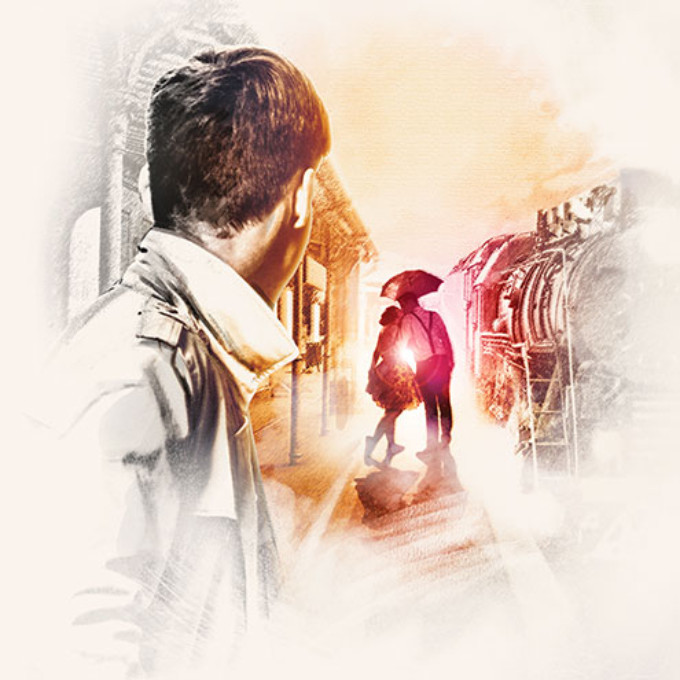
What's the show about?
Aspects of Love is basically what the title says. It's a show that's about the aspects of love, from passion to infatuation to deep love. It centres on a young boy who meets a young woman in a theatre and falls completely in love with her - as does she.
As the journey unfolds, without giving too much away, other characters come into the picture and the love affair is not as clear cut as you'd think. The characters go through lots of different issues. I think that audiences can really connect with all these little aspects of love - we've all felt them at some point.
Deep within love there is trust and companionship, infatuation and new love that feels like a drug. All these things are explored, also learning to love oneself. It feels very relevant now, whereas in the Eighties, I feel like it was a little bit progressive.
It definitely explores loving more than one person at once and how one deals with that. It makes it very honest that you can - you've got one life, so who do you choose to live it with? It's very interesting and I think it's very topical.
Why do you think people need to see it right now?
When you invest in the actors we have and just how truthful and honest and powerful their performances are, seeing a show like this is different from any other Andrew Lloyd Webber show or any other musical. It's sung-through, which you don't see much of anymore - apart from the hip-hop Lin-Manuel Miranda. We don't see many reimagined Lloyd Webber classics. This was a big show that opened on Broadway and in the West End with the big orchestra and Michael Ball starring.
Of course, it was the same content, but there's something in our production that feels different and new. There are a lot of people who don't know the show - it's the one they don't know, they know Cats, they know Phantom, they know Joseph, they know Jesus Christ Superstar.
So, come and see a Lloyd Webber classic with Don Black and Charles Hart reimagined, with a young company originated in an intimate theatre. Come and experience this immersive and, hopefully, life-changing production. I think you could learn about yourself.
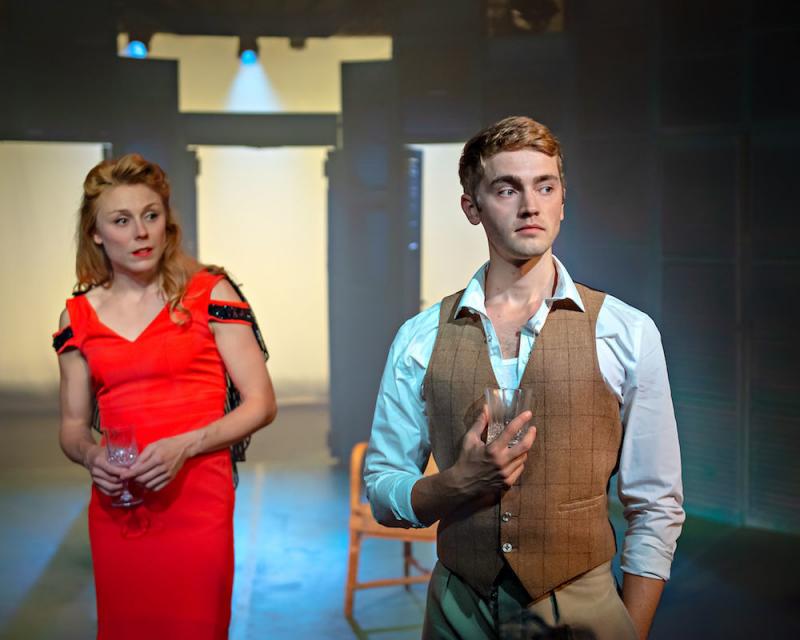
What would you like the audience to take from it?
We have quite an immersive setting - some of the audience are sat on Parisian café tables. I want them to walk in and, just like when you see any powerful piece of theatre, not lose them throughout. The minute it begins you're transfixed, like watching a movie. There's no looking at your watch, there's no thinking about the interval.
You're completely engaged with the story of Alex, Rose, George, Jenny, and Giulietta. You're watching them. You're with them. You're feeling everything they're feeling. You're seeing everybody's bravery and fragility in all these characters, and then you start to see it in yourself.
This is life, this is people, this is honest. I think it's a very honest musical. We only have three instruments rather than an orchestra, which allows us to focus on the acting, not getting lost in the passion of an orchestra which matches the passion of the lyrics which matches the passion of the melodies. That's there, it's always there, whether it's just a piano or a 20-piece orchestra. What we managed to do is match the intimacy of the playing with the music in one world in this small space.
What's your advice for someone who wants to become a producer?
They should try to reach out to some producers they admire - go and have a coffee with them. A lot of people will give them their time. They need to see as much theatre as possible and see what they feel when they watch something they love. Do they think they wish they'd done it themselves? Or can they see themselves putting it on?
They need to understand what the job entails. They should find a book by James Seabright called So You Want To Be A Theatre Producer? and read about what it is, because you don't always know.
As the scale changes, your job can slightly change - understand what your strengths are and what your weaknesses are. As you grow, you might do less admin and more creating, so you've got to find out what it is that you love.
Some people love the admin and budgeting, so maybe they might be better suited as general managers in a small company where your creative opinion is relevant but you're mainly responsible for the machine and the backends. People need to figure out what it is that they want to do. You need to know and see and speak - you've got to read up about it.
Aspects of Love runs at Southwark Playhouse from 7 January 2019 to 9 February, 2019.
Photo credit: Anthony Robling, Darren Bell, Scott Rylander, Claire Bilyard
Videos
